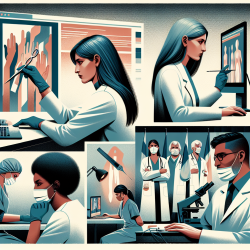Understanding the Importance of Provider Attitudes and Confidence in FGM/C Care
Female genital mutilation/cutting (FGM/C) is a cultural practice that affects approximately 200 million women and girls globally. This practice involves procedures that intentionally alter or cause harm to female genital organs for nonmedical reasons. Health care providers often lack the confidence and appropriate attitudes to provide quality care for women and girls affected by FGM/C. Recent research by Marea et al. (2021) sheds light on factors associated with health care provider attitudes and confidence in FGM/C care, offering valuable insights for practitioners.
Key Findings from the Research
The study, published in Health Equity, conducted a cross-sectional survey of health care providers to explore the associations between provider characteristics, awareness of health complications of FGM/C, attitudes, and confidence for FGM/C care. Here are some critical findings:
- Awareness of Health Complications: Providers who were more aware of the health complications associated with FGM/C exhibited higher confidence in clinical care and communication skills.
- Experience Matters: Providers with more than five years of clinical practice, those who had previously cared for women with FGM/C, and those identifying as women or persons of color showed higher confidence in clinical care.
- Training Gaps: Despite the importance of training, previous training did not significantly correlate with increased confidence, indicating that current training programs may be inadequate.
- Attitudes: Female providers reported significantly less negative attitudes toward FGM/C compared to their male counterparts.
Implications for Health Care Providers
These findings have significant implications for health care providers who aim to improve their care for women and girls affected by FGM/C:
- Enhance Awareness: Increasing awareness of the health complications associated with FGM/C is crucial. This can be achieved through comprehensive educational programs and continuous professional development.
- Experience and Exposure: Gaining experience in caring for women with FGM/C can build confidence. Providers should seek opportunities to work with affected populations and learn from experienced colleagues.
- Effective Training Programs: Current training programs need to be re-evaluated and improved. Simulation-based training, which has been shown to improve confidence and patient outcomes, should be integrated into FGM/C care training.
- Attitude Adjustment: Providers should engage in self-reflection and discussions to understand and mitigate their biases. This can help reduce negative attitudes and improve patient-provider relationships.
Encouraging Further Research
While this study provides valuable insights, further research is needed to explore the intricate relationships between provider characteristics, knowledge, attitudes, and practices. Future studies should investigate how patients and providers interpret and experience communication during clinical visits to identify areas of incongruence. Additionally, exploring the impact of implicit biases and political affiliations on provider attitudes can offer deeper understanding and inform targeted interventions.
Conclusion
Health care providers play a critical role in the care of women and girls affected by FGM/C. By enhancing awareness, gaining experience, improving training programs, and addressing attitudes, providers can significantly improve the quality of care. To read the original research paper, please follow this link: Factors Associated with Health Care Provider Attitudes, and Confidence for the Care of Women and Girls Affected by Female Genital Mutilation/Cutting.










